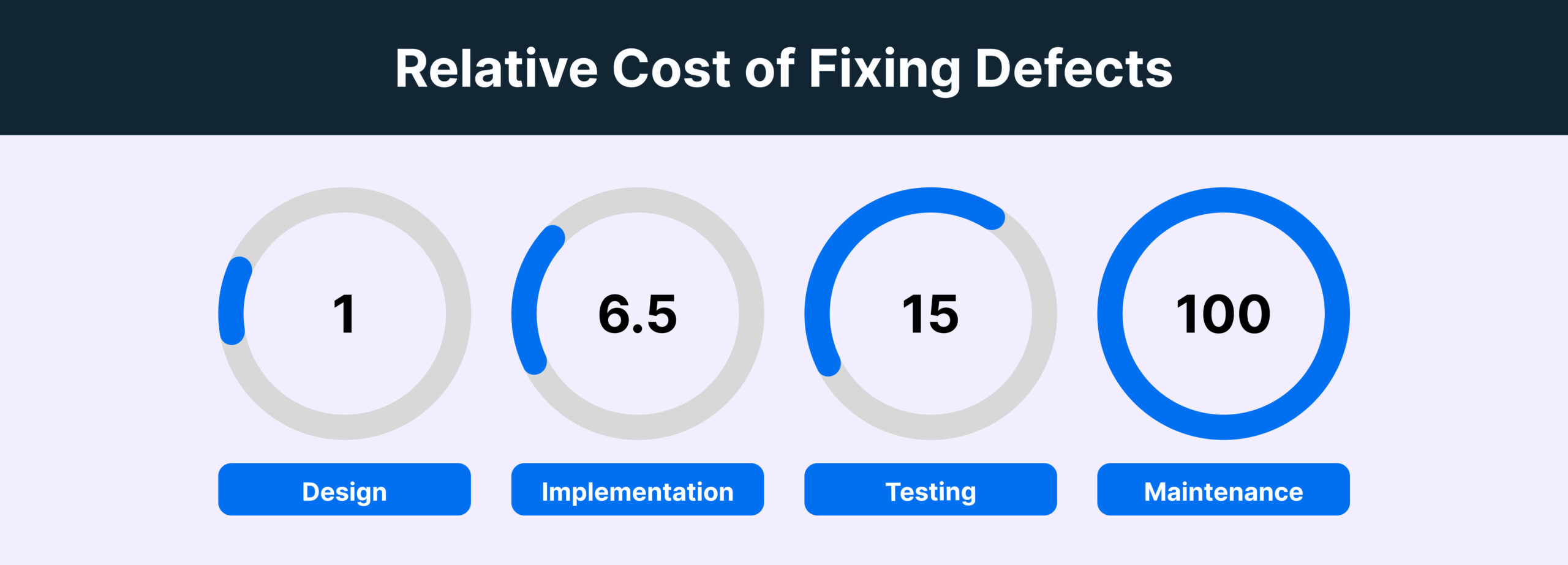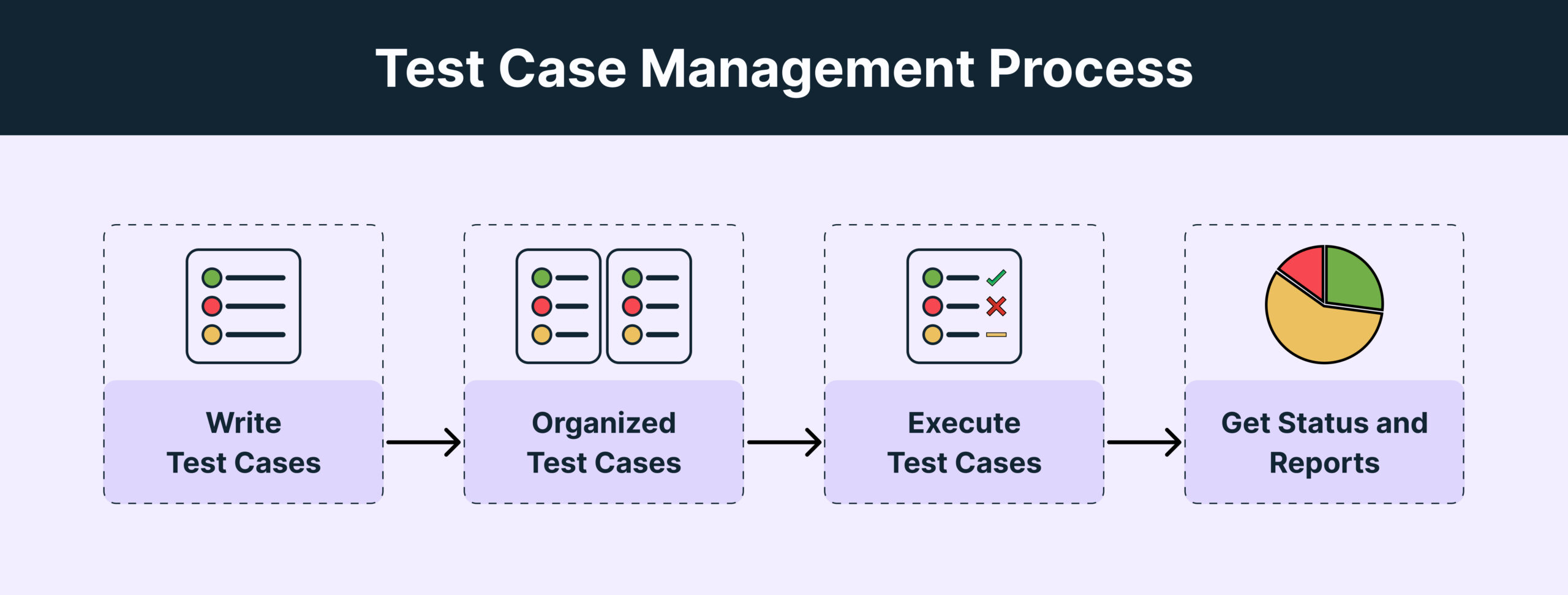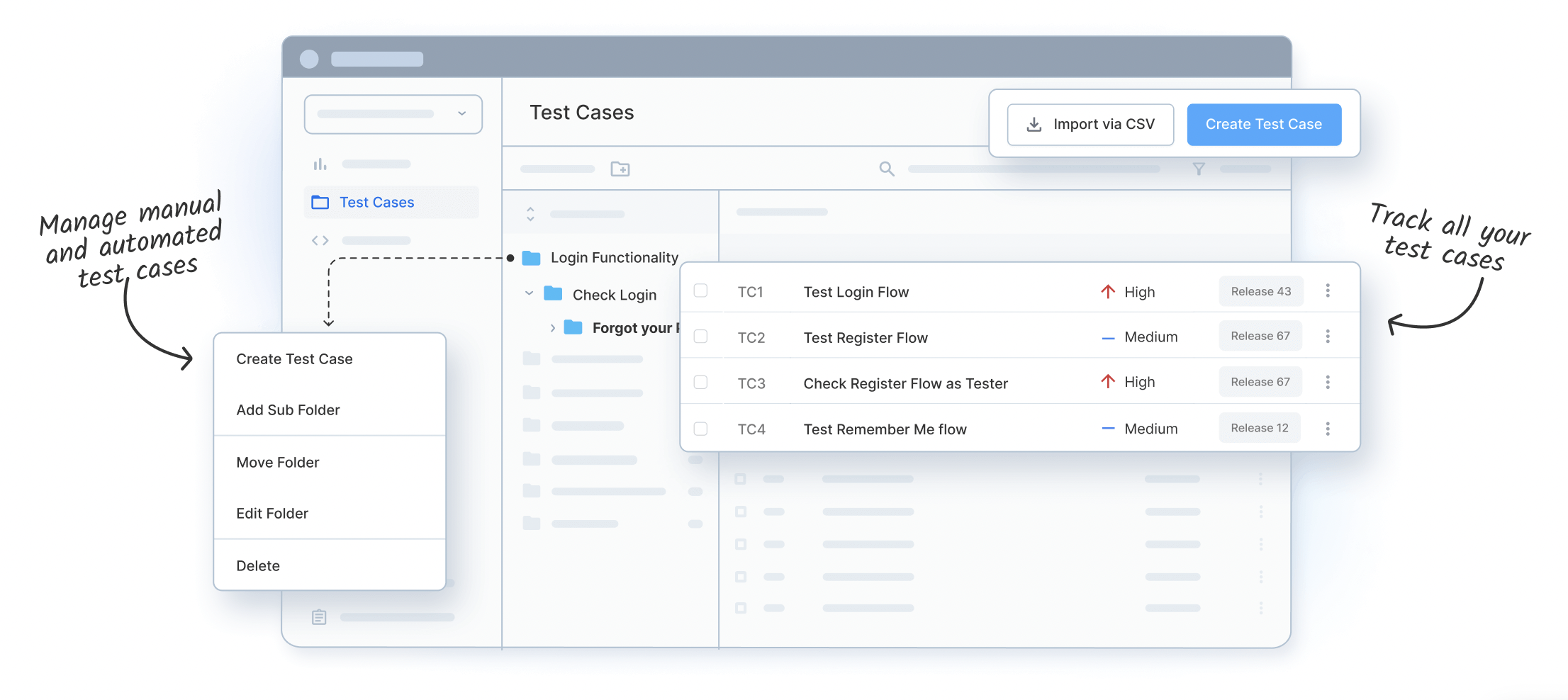What is Test Case Management?
What is Test Case Management?
Test Case Management (TCM) is the processTest case of creating, organizing, managing, and tracking test cases within a software testing environment. It involves designing, executing, and monitoring test cases to ensure the quality and reliability of software applications.
Software test case management primarily deals with:
- Test Case Creation
- Organization and Structuring
- Version Control
- Execution and Tracking
- Defect Tracking
- Reporting and Analysis
Software Test Case Management tools provide a centralized platform to facilitate these activities. These tools offer features like test case creation, version control, test execution, reporting, integration with other development tools, and collaboration capabilities, streamlining the testing process and enhancing overall software quality.
Why is Test Case Management important?
Poor Software quality costs nearly USD 2.41 Trillion each year in the US. Also, 48% of the software projects fail due to Poor Documentation.
You can prevent common software project failure reasons by effective test case management.
Test case management is crucial for software development from productivity and efficency perspective. It helps with:
- Better Documentation and Organization
- Faster Release
- Reusability of Test Cases
- Efficient Resource Utilization
- Cost-effectiveness
- Better Visibility and Control
Better Documentation and Organization
Poor documentation is a major reason for software failure. With Test Case Management, you can ensure standardization in Test Case Documentation. It helps create, manage and track the test cases efficiently.
Proper documentation and organization makes test case more traceable and relevant with respect to the requirements, which improves the overall accuracy and maintainability of test cases.
Faster release
Effective Test Management ensures Test Reusability, better Test Coverage, and optimized Test Execution. This leads to faster release of high-quality software. Using Test Case Management, you can set priority of test cases, use automation wherever possible, and enhance traceability of test cases.
Reusability of Test Cases
Did you know 60% of the test cases can be reused and plugged to a new project by utilizing the existing blocks of test cases
Test Case Management standardize test creation, which enhances reusability of test cases on similar test scenarios. It saves time, effort and resources to create test cases. It shows significant efficiency in larger projects with high volume of test cases.
Efficient Resource Utilization
Test case management optimizes the utilization of testing resources by allowing teams to prioritize test cases based on critical functionalities, risk factors, or business priorities. This ensures that limited resources are used efficiently for maximum test coverage. It makes the testing process efficient and uses resources optimally, preventing wastage or under-resourcing from causing software project failure.
Cost-effectiveness
Did you know software bugs cause economic damage of $316 billion per year globally?
An effective test case management system increases the chances of finding and fixing bugs in the testing stage. This helps save costs related to fixing defects by up to 85%. The faster the defect is caught, the lesser cost is incurred in fixing the defect.
Moreover, test case management provides traceability between requirements, test cases, and defects, which makes debugging more efficient.
Better Visibility and Control
Test Case Management allows project stakeholders to track progress of test cases. It helps them identify bottlenecks and make informed decisions, especially for larger projects due to better traceability and accountability. It enables project managers to have better control over the test cases.
Since QA is allocated almost over 50% of the total software development budget, having control over the process is crucial. Test Case Management allows you to have more organized documentation for seamless handovers, especially for long-running projects.
Who needs Test Case Management?
Test Case Management is used for delivering high-quality software applications by:
- Developers, who perform unit testing and debug code based on test results, to deliver error-free code. Clear test cases aid in understanding the intended functionalities, helping developers write more robust code and perform effective unit testing.
- QAs, who organize, execute, and track test cases, ensuring comprehensive coverage and effective defect management.
- Product Managers, who foresee the product lifecycle, allocate resources and make decisions for future trajectory of product development based on the visibility into testing progress.
- Business Analysts, who ensure all the test cases are well aligned with the business requirements specs at every stage, keeping users’ interests in mind.
Understanding Test Case Management Process
The Test Case Management (TCM) process involves several key steps to create, execute, and track test cases.
Creating Test Cases
- Requirement Analysis: Understand the requirements and align it with the software’s functionalities and business needs
- Test Case Design: Create detailed test cases that cover different scenarios, including positive and negative cases, edge cases, and boundary conditions. Each test case should have clear steps, inputs, expected outcomes, and prerequisites.
Test Case Execution
- Organizing Test Case: Categorise and organize test cases based on modules, functionalities, priority, or any other relevant criteria for easy navigation and management of test cases.
- Test Case Execution: Execute test cases according to the test plan. Document the actual results, any deviations from expected outcomes, and encountered defects.
Tracking and Maintenance of Test Case
- Defect Tracking and Management: Record defects found during test case execution. Use a defect tracking system to prioritize, assign, and monitor the status of each defect until resolution.
- Test Reporting and Analysis: Generate reports summarising test execution results, including pass/fail rates, defect density, test coverage, and other metrics. Analyze these reports to identify trends, areas needing improvement, and overall project status.
- Test Case Maintenance: Regularly review and update test cases to reflect changes in requirements, functionalities, or fixes. Keep the test cases current and relevant to ensure accurate testing.
An efficient Test Case Management process ensures that testing activities are well-organized, thorough, and aligned with project objectives. It contributes to higher software quality, faster defect resolution, and overall project success.
Learn More about Test Case Management
Why Should You Use BrowserStack Test Management?
BrowserStack Test Management is an AI-powered, unified platform designed to accelerate test case creation, execution, and automation with up to 90% faster test authoring and 50% improved coverage.
It offers seamless integrations, real-time visibility through customizable dashboards, and advanced AI agents that streamline testing workflows for both manual and automated tests.
Built for teams of all sizes, it ensures secure data handling while enabling high-quality, efficient software delivery.
Key Features
- AI-Powered Test Case Creation: Automatically generate comprehensive test cases from Product Requirement Documents (PRDs), user stories, or text prompts. AI also suggests enhancements to existing test cases, reducing manual effort significantly.
- Test Deduplication Agent: Detects exact or semantically similar test cases across your repository, providing intelligent recommendations for merging or removal to maintain a clean and efficient test suite.
- Low-Code Automated Test Authoring: Quickly convert manual test cases into low-code automated tests to accelerate automation adoption without requiring deep coding skills.
- Intelligent Test Selection Agent: Uses AI to identify and recommend the most relevant tests for execution, optimizing test runs and focusing on critical test coverage.
- Unified Test Management: Manage all manual and automated test cases in one centralized platform with full traceability from requirements to defects through seamless integrations with Jira, Azure DevOps, and more.
- Powerful Dashboard Analytics: Access customizable dashboards that offer real-time insights, track release status, monitor historical trends, and visualize testing metrics, including automation coverage.
- Shared Steps for Reusability: Mark repetitive test steps as shared within test cases to enhance reusability and save effort when creating or maintaining test cases.
- Quick Import & Custom Field Mapping: Import test cases rapidly from CSV files or existing management tools with automatic field mapping and on-the-fly custom field creation.
- AI-Powered Jira App with Two-Way Binding: Synchronize test cases and runs between BrowserStack Test Management and Jira, allowing management from both platforms with AI-driven assistance.
- Streamlined Manual and Automated Test Runs: Plan and execute test runs across manual and automated tests. Supports dynamic test inclusion and uploading automation results from frameworks like JUnit and BDD-JSON.
- Support for Automation Frameworks & CI/CD Tools: Integrates with popular frameworks and CI/CD platforms, enabling scalable test automation workflows.
- Debugging Insights: Gain deep insights into the performance and quality of test runs through integrated observability tools for faster debugging and issue identification.
BrowserStack Test Management’s free version provides unlimited test cases, strong integrations, and live reporting for efficient test management
Try BrowserStack Test Management Now
Create/Import Test Cases
BrowserStack Test Management allows you to migrate your existing project data from TestRail or Zephyr Scale by selecting “Quick Import”.
Also, you can import data from CSV by selecting “Start from Scratch” or write test cases from scratch within the BrowserStack Test Management Tool.
Manage Test Cases
You can manage your existing test suite or create a new one from scratch using BrowserStack Test Management using simple steps:
- To create a new Project in Test Management, Select Create Project > Enter Project Name and Description > Click Create Project.
- To create a New Folder within a Project, Select Test Cases > Create Folder. You can add test cases within the folder.
- To create Test Case within a Folder in Test Management Tool add all details and click Create.
- You can also Import via TestRail, Zephyr Scale or CSV.
You can copy or move, edit or delete test cases to manage them better. Also, BrowserStack Test Management allows you to apply filters to test cases for efficient test case management.
Run Test Cases
BrowserStack Test Management tool enables you to run manual and automated test cases. You can integrate test case ID tagging with test suites for better visibility and tracking of individual test cases.
You can also run critical test cases by assigning Priority of Test Cases using Custom Configurations in Test Run.
Best Practices for Effective Test Case Management
Best Practices for effective test case management usually involve:
- Optimize test cases and incorporate test case management wherever possible.
- Use a clear and structured format for writing Test Cases. Categorize test cases logically such as Test case specifications, including ID, title, and description.
- Use a hierarchical structure to make it easy to navigate and locate specific test cases.
- Carefully Outline the input and expected output, providing comprehensive details to improve testing procedures.
- Implement version control for test cases to track changes and ensure that everyone is using the latest version by clearly labeling versions and changes.
- Establish traceability between requirements, test cases, and defects.
- Prioritize test cases based on criticality, business impact, or frequency of use. Focus on high-priority test cases while test execution.
- Leverage test case management tools like BrowserStack Test Management to streamline the process.
- Design test cases that are modular and reusable to save time and effort.
- Identify repetitive and time-consuming test cases and automate to expedite the process
- Conduct regular reviews of test cases to ensure accuracy and relevance with timely maintenance
- Conduct retrospectives after testing cycles to identify areas for improvement.
- Enhance productivity by using a Centralized Test Repository like that in BrowserStack Test Management for effective Test Case Management of large-scale projects.
Conclusion
Test case management is fundamental for maintaining the quality, reliability, and efficiency of software testing processes. It streamlines testing efforts, improves collaboration, and ensures that software meets quality standards while being delivered within set timelines.
Using tools like Browserstack Test Management you can create, manage and track manual and automated test cases with its integrated end-to-end workflows and dashboards. You can maintain a centralized repository for all your manual and automated test cases for better visibility and control over the testing process.
By having an effective test case management system you can enhance software delivery process at multiple levels.







